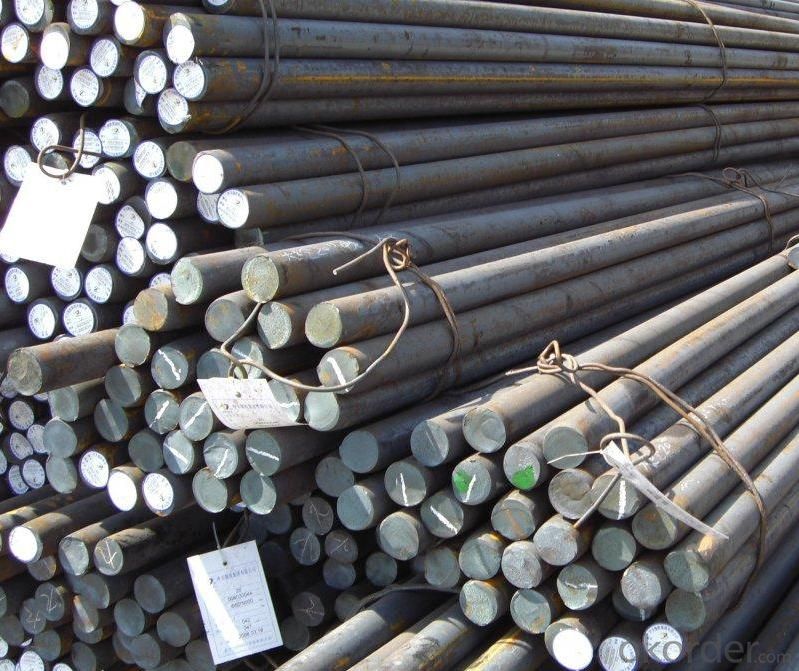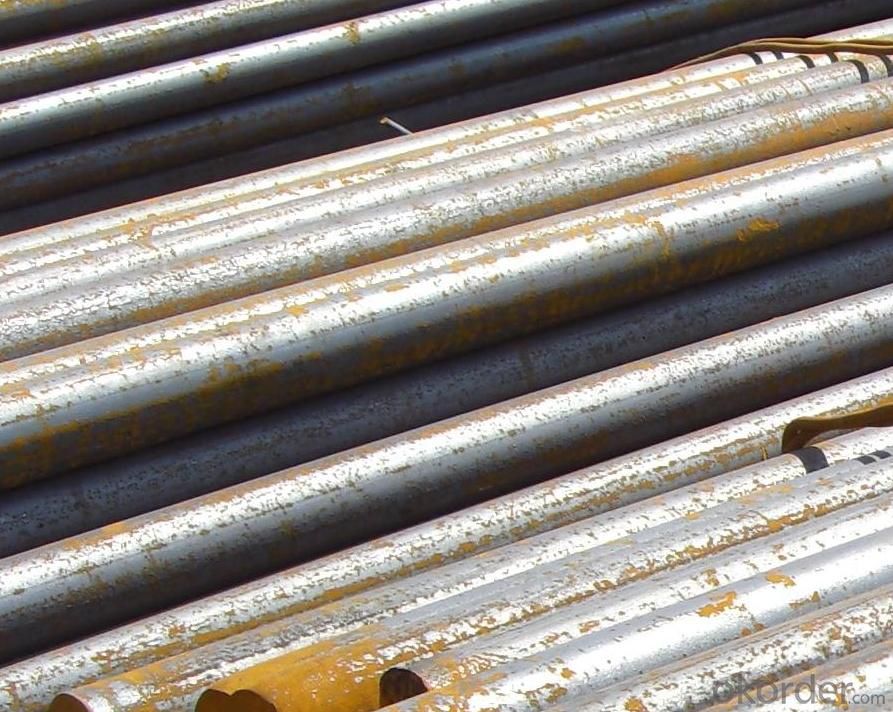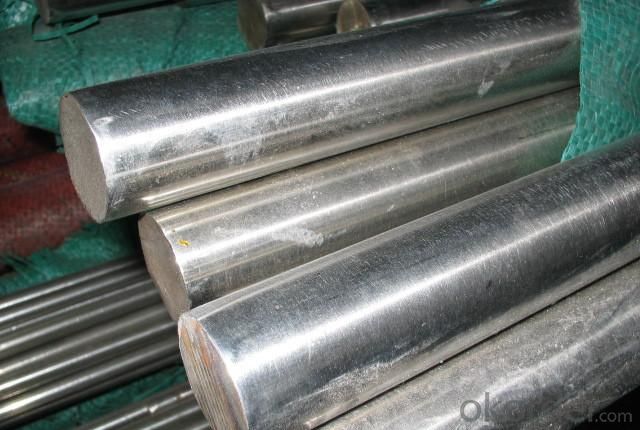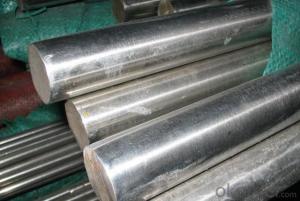Alloy Steel SCM435 Bar Made In China
- Loading Port:
- Tianjin
- Payment Terms:
- TT OR LC
- Min Order Qty:
- 25 m.t.
- Supply Capability:
- 50000 m.t./month
OKorder Service Pledge
OKorder Financial Service
You Might Also Like
Item specifice
Alloy Steel SCM435 Bar Made In China
Product description:
1. Produce Standard: GB, AISI, ASTM, SAE, EN, BS, DIN, JIS
2. Produce processes: Smelt Iron -EAF smelt Billet - ESR smelt Billet -Hot rolled or forged get the steel round bar and plate
3. Heat treatment: Normalized / Annealed / Quenched+Tempered
4. Quality assurance: All order we can received third party inspection, You can let SGS, BV,.. and others test company test and inspect our products before Goods shipping.
Chemical Composition(%):
C | Si | Mn | Cr | Mo | Ni | P | S |
0.32-0.40 | 0.20-0.40 | 0.40-0.70 | 0.80-1.10 | 0.15-0.25 | ≤0.30 | ≤0.035 | ≤0.035 |
Applications:
35CrMo(A30352)/4135/SCM435/34CrMo4(1.7220) alloy structural steel
35CrMo(A30352)/4135/SCM435/34CrMo4(1.7220) alloy structural steel is used to be manufactured all kinds of important parts which can bear impact, crankle, high heavy load, such as the herringbone gear of the rolling machine, bent roller, plumbing bar, connecting rod, fasteners, spindle of the steamer engine, axle, driving parts of engine, large motor reel, perforator of the oil machinery, boiler bolt whose working temperature is below 400°C, nut whose working temperature is below 510°C, conduit of the high-pressure seamless thick wall in the chemical machinery, etc.
Advantages:
1) ISO9001:2008 certified company.
2) Quality & Quantity Assurance with competitive prices.
3) Delivery & dealings as per Commitment.
4) Highly experience qualified production and sales team.
5) Your satisfaction is guaranteed according your demand.
Product Show:



- Q:How does special steel contribute to the construction equipment industry?
- The construction equipment industry heavily relies on special steel to ensure the necessary strength, durability, and resistance to wear and tear in their heavy-duty equipment. Extreme conditions, including heavy loads, harsh environments, and constant use, demand the use of special steel alloys that are specifically designed to withstand these challenges and guarantee the equipment's longevity and reliability. One of the major contributions of special steel to the construction equipment industry lies in its impressive strength-to-weight ratio. This characteristic allows manufacturers to design and produce equipment that is both robust and lightweight. Implementing special steel in the construction of crucial equipment components such as chassis, booms, buckets, and blades enhances their load-carrying capacity and overall performance. Additionally, special steel offers exceptional corrosion resistance, which is a significant advantage in construction sites where equipment is exposed to moisture, chemicals, and other corrosive substances. By utilizing corrosion-resistant special steel alloys, manufacturers can extend the lifespan of construction equipment and reduce maintenance costs. Moreover, special steel plays a vital role in providing superior wear resistance. The abrasive materials encountered in construction sites, such as rocks, gravel, and concrete, can cause significant wear on equipment components. Special steel alloys with high hardness and wear resistance properties help minimize wear and prolong the service life of the equipment, reducing the need for frequent replacements and downtime. Furthermore, special steel enables the construction equipment industry to meet specific performance requirements. Various types of special steel alloys can be tailored to meet specific needs, such as impact resistance, high-temperature resistance, or low-temperature toughness. This versatility allows manufacturers to produce equipment that can efficiently operate in diverse conditions, ultimately enhancing the industry's overall productivity. In conclusion, special steel plays a crucial role in the construction equipment industry by providing the necessary strength, durability, resistance to wear and tear, and customization options. By incorporating special steel alloys into their manufacturing processes, equipment manufacturers can produce high-quality machinery that meets the demanding requirements of construction sites, thus improving productivity, safety, and efficiency within the industry.
- Q:How does special steel contribute to the heavy equipment industry?
- Special steel contributes to the heavy equipment industry by offering enhanced strength, durability, and resistance to wear and tear. It enables the production of high-performance components and parts, such as gears, axles, and blades, that can withstand heavy loads, extreme temperatures, and harsh environments. The use of special steel in heavy equipment ensures improved safety, increased productivity, and longer service life, making it a critical material for the industry.
- Q:How does corrosion-resistant steel protect against chemical attacks?
- Corrosion-resistant steel protects against chemical attacks by forming a protective layer on its surface that prevents the penetration of corrosive substances. This layer, usually composed of chromium oxide, acts as a barrier that shields the underlying steel from the damaging effects of chemicals, thus preserving its structural integrity and preventing corrosion.
- Q:What are the different forming processes for special steel?
- There are several different forming processes for special steel, including hot rolling, cold rolling, forging, extrusion, and casting.
- Q:What is the significance of special steel in the medical field?
- Special steel, also known as medical grade steel, plays a crucial role in the medical field due to its unique properties and significance. It is specifically designed and manufactured to meet the stringent requirements of the healthcare industry. The significance of special steel in the medical field can be understood through the following points: 1. Biocompatibility: Special steel is biocompatible, meaning it is non-toxic and does not provoke an adverse reaction when in contact with the human body. This makes it an ideal material for medical devices such as surgical instruments, implants, and orthopedic tools. 2. Corrosion resistance: Special steel is highly resistant to corrosion and rust, ensuring the longevity and durability of medical instruments. Instruments used in surgical procedures need to be repeatedly sterilized, and the corrosive nature of sterilization agents can degrade ordinary steel. Special steel, with its superior corrosion resistance, can withstand these harsh conditions, reducing the risk of contamination and maintaining the integrity of medical equipment. 3. Mechanical properties: Special steel possesses excellent mechanical properties, such as high strength, toughness, and ductility. These characteristics are essential for medical devices, as they need to withstand the stresses and strains of surgical procedures, maintain their shape, and provide reliable performance. 4. Sterilization compatibility: Special steel can withstand various sterilization methods, including steam sterilization, ethylene oxide sterilization, and gamma radiation. This ensures that medical instruments made from special steel can be effectively sterilized, preventing the transmission of infections and reducing the risk of contamination during surgeries. 5. Precision manufacturing: Special steel can be fabricated into intricate shapes and sizes, allowing the production of precise medical instruments. Its superior machinability enables the creation of fine and sharp edges, crucial for surgical tools used in delicate procedures. 6. Antibacterial properties: Some special steels, such as stainless steel, possess inherent antibacterial properties. This characteristic is particularly important in the medical field, where the prevention of infections is paramount. Instruments made from antibacterial special steel can inhibit the growth of bacteria, minimizing the risk of post-operative complications. In summary, the significance of special steel in the medical field lies in its biocompatibility, corrosion resistance, mechanical properties, sterilization compatibility, precision manufacturing, and potential antibacterial properties. These qualities make special steel an indispensable material for manufacturing medical devices, ensuring their reliability, durability, and safety for both healthcare professionals and patients.
- Q:How is special steel used in the production of turbine shafts?
- Special steel is used in the production of turbine shafts due to its high strength, durability, and resistance to corrosion and fatigue. The unique properties of special steel make it ideal for withstanding the extreme conditions and loads experienced by turbine shafts during operation, ensuring efficient and reliable power generation.
- Q:How does special steel withstand high-velocity impacts?
- Due to its unique properties and composition, special steel possesses the capability to endure high-velocity impacts. A crucial factor contributing to this capability is its high strength and hardness, which allows it to withstand extreme forces without deforming or fracturing. Additionally, special steel often incorporates alloying elements like chromium, molybdenum, nickel, and vanadium, which enhance its exceptional toughness and resistance to impacts. Furthermore, special steel frequently undergoes heat treatment to improve its mechanical properties. This involves processes like quenching and tempering that modify the steel's microstructure, resulting in a refined and strengthened structure. This heat treatment also augments the steel's capacity to absorb and disperse energy during high-velocity impacts, thereby lowering the risk of failure. Moreover, special steel is frequently tailored with specific alloys and compositions to optimize its performance in specific applications. For instance, certain grades of steel are engineered specifically for armor applications, where they must endure high-velocity impacts from projectiles. These steels may incorporate additional elements like boron or titanium, further enhancing their ability to resist penetration and deformation under extreme loads. In conclusion, special steel's ability to withstand high-velocity impacts can be attributed to its high strength, hardness, toughness, and impact resistance. Its distinctive composition, heat treatment processes, and targeted design render it a dependable choice for applications where impact resistance is of utmost importance.
- Q:What are the different joining methods for special steel?
- The different joining methods for special steel include welding, brazing, soldering, and adhesive bonding.
- Q:What are the requirements for special steel used in aerospace defense applications?
- The requirements for special steel used in aerospace defense applications are quite stringent due to the critical nature of these applications. Some of the key requirements include: 1. High strength: Special steel used in aerospace defense applications must possess high strength to withstand extreme conditions and loads. This is essential for ensuring the structural integrity of aircraft and defense equipment. 2. Excellent corrosion resistance: Aerospace defense applications often expose the steel to harsh environments, including moisture, saltwater, and chemicals. Therefore, the steel must have exceptional corrosion resistance to prevent degradation and maintain its performance over time. 3. High temperature resistance: Special steel used in aerospace defense applications must have the ability to withstand high temperatures without losing its mechanical properties. This is crucial for components that operate in high-temperature environments, such as jet engines and rocket nozzles. 4. Fatigue resistance: The steel should be able to resist fatigue failure caused by cyclic loading, as aerospace defense applications often involve repeated stress cycles. Fatigue resistance ensures that the steel can endure long service lives without failure. 5. Lightweight: Weight reduction is a critical factor in aerospace defense applications to enhance fuel efficiency, increase payload capacity, and improve overall performance. Therefore, the special steel used should have a high strength-to-weight ratio, allowing for lighter structures without compromising strength. 6. High purity and cleanliness: The steel used in aerospace defense applications must have a high level of purity and cleanliness to minimize the presence of impurities and defects. This is crucial to ensure the reliability and longevity of the steel in demanding operational conditions. 7. Compatibility with other materials: Special steel used in aerospace defense applications should be compatible with other materials commonly used in these applications, such as aluminum alloys and composite materials. Compatibility ensures a reliable and efficient integration of different components and structures. Meeting these requirements often involves using advanced manufacturing techniques, such as vacuum melting, precise alloying, and heat treatment processes, to achieve the desired properties. Additionally, strict quality control measures, including non-destructive testing and material certification, are crucial to ensure the performance and reliability of special steel in aerospace defense applications.
- Q:How does special steel perform under high temperatures?
- Special steel, also known as high-temperature steel, exhibits excellent performance under high temperatures. It maintains its strength, hardness, and resistance to deformation, making it suitable for various applications in extreme heat conditions. Additionally, special steel can withstand thermal stress and oxidation, ensuring its durability and reliability in high-temperature environments.
1. Manufacturer Overview |
|
|---|---|
| Location | |
| Year Established | |
| Annual Output Value | |
| Main Markets | |
| Company Certifications | |
2. Manufacturer Certificates |
|
|---|---|
| a) Certification Name | |
| Range | |
| Reference | |
| Validity Period | |
3. Manufacturer Capability |
|
|---|---|
| a)Trade Capacity | |
| Nearest Port | |
| Export Percentage | |
| No.of Employees in Trade Department | |
| Language Spoken: | |
| b)Factory Information | |
| Factory Size: | |
| No. of Production Lines | |
| Contract Manufacturing | |
| Product Price Range | |
Send your message to us
Alloy Steel SCM435 Bar Made In China
- Loading Port:
- Tianjin
- Payment Terms:
- TT OR LC
- Min Order Qty:
- 25 m.t.
- Supply Capability:
- 50000 m.t./month
OKorder Service Pledge
OKorder Financial Service
Similar products
New products
Hot products
Related keywords






























